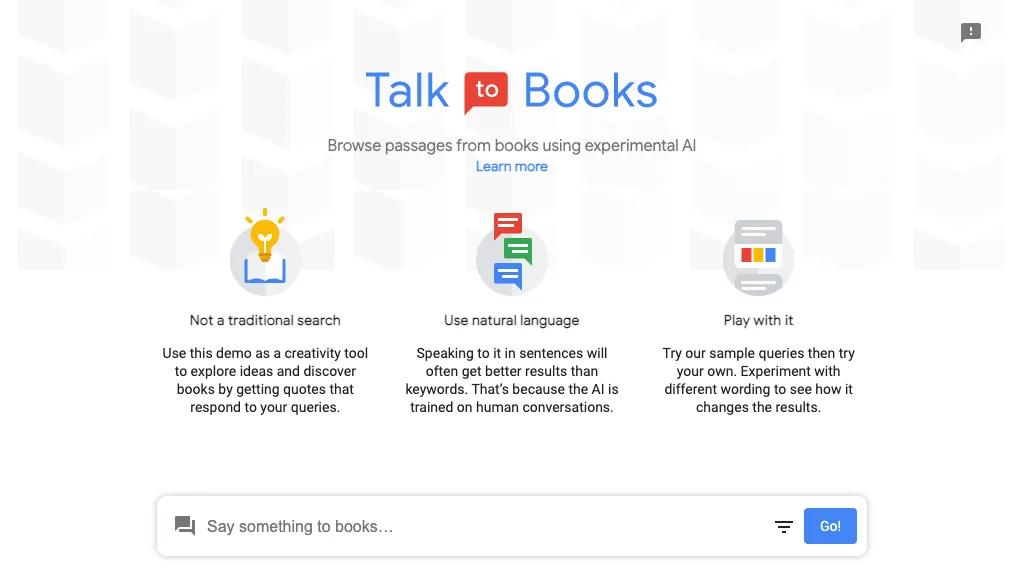What is Talk to Books?
Talk to Books is a completely new AI-based tool developed by Google that makes it possible for people to search for and discover their desired books through natural language queries. Being based on machine learning, it improves search results in the process and is capable of returning effective replies to complex sentence searches. It also has many other creative features for exploring and finding ideas that allow users to play with different keywords and sample queries and return diverse search results.
Talk to Books-Google: Key Features & Benefits
Talk to Books has a number of features and benefits for users cut across diverse applications. Some of the key features are as follows:
-
Book Search:
Search with ease for books on subjects of your query. -
Passage Discovery:
Find passages in a book relevant to your search. -
Natural Language Search:
Use natural, everyday language when searching. -
Creative Features:
Find new ideas or explore and brainstorm them. -
Idea Exploration:
Try out new keywords to find ideas one might not have come across.
The benefits of using Talk to Books include an improved ability to get relevant information fast, a nice user interface, and the capacity for quick brainstorming: allowing the users to creatively think through their ideas. What distinguishes this particular application from a simple Search is advanced NLP and machine learning capabilities.
Talk to Books (Google) Use Cases and Applications
Talk to Books can be used in a variety of cases and scenarios, including:
-
Finding relevant passages:
This would be very useful in identifying a particular passage from a book. -
Generating ideas:
This can be used to create new ideas with its creative features. -
Searching for sample results:
One can try typing in a sample query to return very different search results.
The beneficiaries of this tool range from a book enthusiast, researcher, and students to librarians and non-technical users. Researchers can use it to identify literature in their interest quickly; students will get help in their academic assignments and projects.
How to Use Talk to Books (Google)
The steps for using Talk to Books are very simple:
- Go to the website of Talk to Books.
- Type your question in natural language into their search bar.
- Scroll through the search results for pertinent books and passages.
- Try different keywords and sample queries to get a feel for various results.
- Use specific and detailed queries for the best results. The user interface is very user-friendly, so one can easily navigate even if not technically savvy.
How Talk to Books — Google — Works
Talk to Books applies complex machine learning algorithms that read and respond to natural language questions. The tool draws upon the enormous database of books maintained by Google, indexes text to find the most relevant passages to a user’s query. The crux of the workout is designed to come up with fast and accurate results for the end user.
Pros and Cons of Talk to Books
No tool is perfect; Talk to Books has its pros and some probable cons:
Pros:
- Advanced NLP capabilities
- Relevant and fast search
- Easy to use
- Creative and idea-developing
Possible Cons:
- Won’t always be able to detect books or passages from a niche in search of.
- Reliant on the quality and scope of Google’s book database.
Users’ Reviews
The users’ reviews are mostly positive, with the vast majority of reviewers admiring the ingenuity behind the new way of discovering books and the ease of using them.
Conclusion on Talk to Books (Google)
Powerfully, Talk to Books by Google is a very powerful tool which revolutionizes the way users were hitherto searching for and discovering books. Its advanced natural language processing, combined with the user-friendly interface, has brought value to a very wide range of users: researchers, students, readers, and everybody interested in searching for relevant information and brainstorming new ideas. With constant updates and new improvements by Google, its future prospects become really bright.
Talk to Books (Google) FAQs
Q: Does the relevance of results depend on the query?
A: This depends both on the specificity of a query and on how much data is available within Google’s book database, but in principle, the tool is conceived to return very relevant content based on natural language processing.
Q: Can I use this for academic research?
A: Certainly. The expediency of using Talk to Books for researchers while searching for relevant literature and passages becomes valuable for academic work.
Q: Is using Talk to Books free?
A: Yes, Talk to Books is free by Google.
Q: What types of queries work best with Talk to Books?
A: These work best when one is as specific and descriptive as possible. The use of natural language in how a question is asked will help pull out more relevant passages too.
Q: Is Talk to Books easy to use for non-technical users?
A: Its user interface is simple and intuitive, useful for people with all levels of technical experience.










